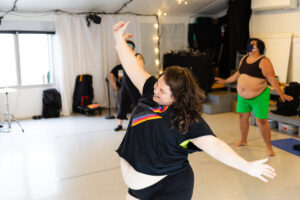
I was invited to speak at a truly lovely event on Wednesday. A gathering of people working for organisations, large and small, or for themselves, all involved in community and participatory dance or dance in education. I was really inspired by this gathering: I found the tone to be energetic and respectful and positive and professional. It was excellently facilitated and I loved hearing about great practice happening across this region of England, far away from my own, in a very detailed way. I was touched to hear colleagues speak about challenges as well as lots of successes, and reach out for help honestly and without shame.
Two of the organisational workers stood up and talked about collective work that had happened around advocacy for dance in education. This is vital work and I was pleased to hear about it, in part through a short video addressed to policy-makers. However, one of the talking heads in the video, a senior dance worker in a major dance organisation, very flippantly said that a reason for dance in education is because a percentage (which I won’t repeat) of children in schools are o*ese. This word is starred because it is a slur, a deliberately stigmatising word to describe fat people only in order to separate us as ‘diseased’ and to try to force us to change our bodies. I remind you that forcing children to lose weight is child abuse.
I was the only fat person in the room. Moreover – perhaps – I am a fat dance artist working on and with fat, very visibly, with a range of institutions across England and abroad. From that position, here were my reactions on hearing a slur about bodies like mine – bodies like mine, but belonging to children – in a place of work:
- “Fuck that!”, audibly to my table
- Fear and rage, boiling insides and hurt; tears
- Stepping out to speak to a senior member of staff at the organisation who invited me – an organisation I’ve been working closely and positively with on my fat-related work – whom I felt very much understood why I was upset, and who apologised, promised to take down the video and adjust the language, and do further work (and I believe them)
- Re-entering the space, completely distracted, ruminating on how I could possibly stand up in front of a room of people when I have had to listen to how my body is something that should be changed by taking part in my artform
- A mental shut-down; an inability to speak to people cogently
I decided that when it was my turn to speak, I would use the first couple of minutes to explain why I was so upset, and then move on to my prepared material on professional dance work with non-professional dancers, an area of work in which I am a qualified expert. This is something of what I said, not verbatim:
I am hurt because I am unsafe here
I am the only fat person in the room and I have had to endure hearing a slur about bodies like mine
I do not wish to show you images I have brought to share because they include fat people and this is not a safe space to do that
It hurts me that dance is used to police rather than empower bodies and people
Anti-fatness emerges only in concert with anti-Blackness and white supremacy
Anti-fatness is profoundly intertwined with ableism
If you think you are an anti-racist or an anti-ableist and you still think fat bodies need to change, I don’t believe you are really an anti-racist or anti-ableist
I then began to try and use my notes to speak about my area of expertise. I knew nobody was listening; I could feel it. I could also feel that the social contract around my role as an objective knower of stuff and my capacity to hold space for others to engage in that was broken. I could not trust anyone any longer. How could I, when I had had to listen how one of the purposes of my artform is to coerce children to change their bodies to be different to mine, because being like me is the worst possible thing?
I put down the microphone, said I couldn’t do this, and walked out. And had a panic attack. I was looked after by a bunch of very kind people who wish me well and want to do better themselves.
I am so disappointed. I am disappointed that I was unable to do my work. I am disappointed that I was emotional in public. I am disappointed to have not been able to engage with other practitioners in a way that could have been more useful to us all.
The thing is, this is of course not at all the first time I’ve had to encounter fatphobia in my work in dance, dance research and dance education, which is the only professional work I’ve done for the past 20 years. It’s probably not even the last moment of overt fatphobia in a professional context that I’ll experience this year (with six weeks to go). What I think this account indicates, more than anything, is that I’ve had enough. I’ve had enough of accepting looks, patronising comments and out-and-out namecalling in my eye- or ear-shot. I’ve had enough of fake liberalism and dance’s capitulation to fatphobic falsehoods to try and save itself from irrelevance. And I’ve absolutely, neverendingly had enough of the field using dance – glorious, wondrous, amazing, lifechanging, everyone’s dance – as a method to attack, punish, and abuse the bodies of fat people.
If you want to do better, the internet awaits your reading and listening. If you want me to guide you through what I know of ‘how not to be awful to fat people’, you can pay me. Otherwise, you and your fatphobia can fuck right off.
